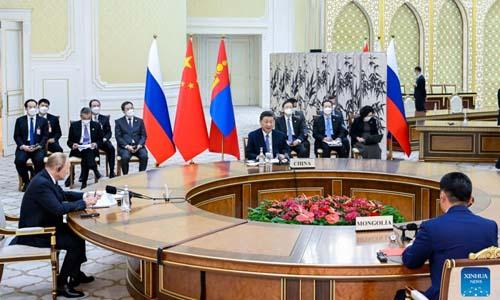
Russia facing China: Little Red Riding Hood or Cinderella? Neither
Andrey Kortunov
Every time I start reading another Western report on the future of Russian-Chinese relations, The Little Red Riding Hood fairy tale comes to mind. As you may recall, in this story a small girl walking through the woods on the way to deliver food to her sickly grandmother comes across a hungry wolf. She is careless enough to enter a casual conversation with it and to inform it about her destination. This adventure does not turn out well for the young lady: the insidious beast eats both the poor sickly grandmother, and in some versions the Little Red Riding Hood herself.
In Western perceptions, in terms of the relations between Russia and China, the former resembles a stupid and naïve girl, while the latter allegedly plays the role of a ferocious and ruthless predator. It is assumed that with time Moscow’s current dependence on Beijing in economic, technological, military and other domains is going to increase dramatically, and that sooner or later China will take advantage of this growing dependence by turning Moscow into its submissive and obedient vassal state.
On the other hand, when I look though many Russian writings on the same bilateral relationship, I cannot but recollect yet another product of folk fantasy – Cinderella. Once again, it is about an unfortunate girl, who is constantly mistreated and abused by her cruel stepmother and her heartless stepsisters. Luckily, poor Cinderella is visited by her fairy godmother, who generously equips Cinderella for the royal ball. The sorceress turns a pumpkin into a golden carriage, mice into horses, a rat into a coachman, and lizards into footmen. She then turns Cinderella’s rags into a beautiful jeweled gown, complete with a delicate pair of glass slippers that make the girl absolutely irresistible to the local prince looking for an appropriate fiancé.
Cooperation with the Middle Kingdom should allow the Kremlin not only to avoid international isolation, but to gain more power and influence around the world. A number of Russian analysts, politicians and opinion-makers apparently take China for the fairy godmother willing to solve all Russia’s numerous problems by offsetting US and EU led sanctions, purchasing ever growing volumes of hydrocarbons, providing Moscow with critically important technologies and siding with the Kremlin in all international organizations and multilateral forums.
However, international relations do not resemble fairy tales. Whatever can be said about Vladimir Putin, he does not look like a naïve and helpless Little Red Riding Hood or a downtrodden and meek Cinderella. He is one of the most experienced and shrewd state leaders around who is particularly concerned about Russia’s national sovereignty and independence. It is hard to imagine him – or even any of his likely successors – yielding sovereignty and independence to any outside power, including China.
Even more importantly, China is neither a hungry wolf, nor a fairy godmother. It is a big country, a great power with its own national interests, aspirations and priorities. Most of those do coincide with Russia’s national interests, aspirations and priorities, and some of them do not. It would make no sense to define Beijing’s approaches to international relations as pro-Moscow or anti-Moscow; they have always been and will continue to be pro-Chinese.
Today, Russia and China now clearly see eye to eye on a range of international security and development issues; such a unity of views is historically justified and also reflects the current geopolitical balance in the international system. This unity constitutes a solid foundation for a long-term mutually beneficial cooperation between the two nations; one can only hope that the relationship will remain vibrant and will get stronger over time. Not only the two nations, but the international system at large would benefit from a stable, predictable and sustainable Russia-China partnership.
Still, be mindful: nobody can do Russia’s homework for Russia. It is up to Moscow to fight corruption and mismanagement, to ease the pressure of bureaucracy on its private sector, to invest in human capital, to promote small business, to fine-tune practices of true federalism and to unleash the creative potential of the Russian people. The more successful the Russian leadership is in meeting these objectives, the more valuable Russia becomes to China and to other foreign countries as a partner. The current crisis in Russia’s relations with the West should become yet another incentive for decision-makers in Moscow to speed up national modernization, not to slow it down.
The writer is a director general of the Russian International Affairs Council
